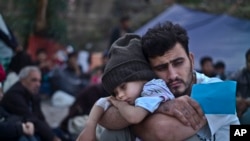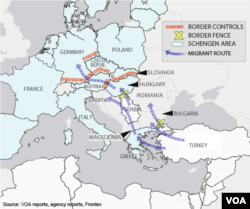Syrian war refugees – many of them young, skilled and aspirational – represent an opportunity Europe should embrace rather than fear, some observers and refugees themselves say.
If properly integrated, young refugees could be a resource to overcome a dire demographic threat to Europe. More than one-fifth of Europeans will be 65 or older by 2025, according to the European Commission, and Europe will face a severe problem funding retirement benefits.
"Young people can be a positive opportunity for destination countries willing to welcome them," the international relief organization Mercy Corps said in a report released this week.
And, at the Center for European Reform, chief economist Christian Odendahl told VOA the migrants could offset the “brain drain” of young professionals from the Balkans and elsewhere in Europe.
"The refugee crisis … poses a challenge but also has the potential to help Europe – or parts of Europe – solve their demographic problems," Odendahl told VOA. "It depends on the extent to which Europeans will be able to integrate migrants, particularly into the labor markets."
Receiving countries also face costs, at least in the short term. Providing food, shelter and services for migrants could cost around 10 billion euros or $11 billion for the year in Germany alone, authorities there predicted in September – and that was before the projected number of asylum-seekers almost doubled above the 800,000 official estimate, according to European newspapers. Germany is the preferred destination for migrants to Europe.
Eager to move on
Abdul Salam, a 27-year-old Syrian, is like many of the young people arriving by the thousands daily on European shores: Frustrated, he has given up on ever returning to his war-torn home country. He wants to finish his higher education, interrupted by the civil war, and to get on with his life. He has managed to scrape out a living in Turkey, but jobs are in short supply.
"After the Russian intervention, there is no solutions coming closer," Salam said, referring to Moscow’s late-September launch of an airstrikes campaign to support embattled Syrian President Bashar al-Assad. "Days are passing, and years are passing as well. I have been waiting for five years and no hope in the horizon. So I have decided to go to Europe to complete my studies and start having a new life there."
Originally from Jarablus, a town now occupied by militants from the Islamic State group, Salam said he does not understand why Europeans don’t appreciate that many of the refugees are skilled and educated, and could benefit the countries that settle them.
"If they are taking them when they are coming illegally, why they don’t put some procedures and conditions and terms for them to go and apply in the embassies, and if they pass and they fulfill the conditions, they can go legally and have a visa?" he wondered.
Assets, not liabilities
Others, too, are pressing for an orderly, proactive migration process for refugees, saving asylum-seekers the perils of turbulent sea crossings and criminal smuggling rings. They’re urging Europeans to view refugees as an opportunity, not a danger or burden.
"It is certainly the case that Syria has been a very well-educated country, and so there are a large number of educated people who are leaving Syria and many of whom are now arriving in Europe," said Benedict Dempsey, a Mercy Corps policy director.
He noted that across the spectrum of refugees and migrants – whether from sub-Saharan Africa or Afghanistan – there is a high level of motivation and aspiration, characteristics that suggest these are not people looking for handouts or wanting to wage jihad in Europe.
In the first seven months of this year, 67 percent of the war refugees arriving illegally in Europe were between the ages of 14 and 34, Mercy Corps said in its new report. Through focus groups, it found many were males escaping recruitment by government forces, insurgents and jihadists. Some young men had been sent by families who believed they were more able to bear the risks of illegal entry.
Young refugees sometimes are viewed as a threat to security, economy and culture. Earlier this month, after the Obama administration announced plans to settle 10,000 Syrians in the United States, front-running Republican presidential candidate Donald Trump said that, if elected, he’d send refugees home because they could be jihadists.
Populist politicians in Europe have echoed Trump's worries.
Resource to host countries
But Mercy Corps’ Dempsey said the movement of refugees into Europe "should be seen as much as an opportunity as it is any kind of risk. The risk, as such as it is, exists more what will happen if people are excluded and marginalized."
He said refugees are looking to Europe because Syria’s neighboring counties – Iraq, Jordan, Lebanon and Turkey – haven’t gotten adequate international support and can’t generate enough living-wage jobs to accommodate them.
The UN’s refugee agency estimates nearly 4.2 million Syrians have been displaced, with 2.1 million sheltering in Egypt, Iraq, Jordan and Lebanon and another 1.9 million in Turkey. The U.N. High Commissioner on Refugees’ office this year appealed for $4.5 billion to aid Syrian refugees, but as of late September international donations had reached only 41 percent of that amount.
"Unfortunately, we remain severely underfunded," a UNHCR spokeswoman wrote in an email.
Even with "the best will in the world, even if people were able to work – and we do think they should be able to – even so, the numbers [of migrants] in those countries are so vast," Dempsey said. "There does have to be some support by resettling refugees in other countries."














